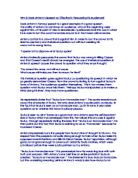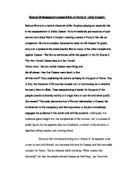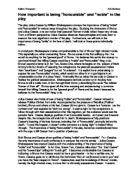Why is Mark Antony's Speech so Effective in Persuading his Audience?
Why is Mark Antony's Speech so Effective in Persuading his Audience? Mark Antony's famous speech is a great example of a good speech. The ability of Antony to convince an audience, who at the beginning were against him, of his point of view is remarkable. I particularly love the way in which he is able to turn the word honorable around to in fact mean dishonorable. Antony confronts a crowd that is against him. In order to turn the crowd to his side he uses irony and rhetorical questions but without breaking his word, not to wrong Brutus, "I speak not to disprove what Brutus spoke" Antony indirectly persuades the crowd that Brutus was wrong in killing Caesar and that Caesar's death should be avenged. The use of rhetorical questions in Antony's speech causes the crowd to question what they once thought. "You loved him once, not without cause What cause withholds you then to mourn for him?" This rhetorical question goes against Brutus by questioning his speech in which he so greatly demonized Caesar. Now the crowd is starting to turn against Brutus in favor of Antony. The audience question themselves. This in turn makes them question what Brutus once told them. 'Perhaps Brutus manipulated us to make us think along his lines', they may have questioned. He repeatedly states that "Brutus is an honorable man". The quote reveals much about the character of Brutus. Not only
to what extent is brutus the real tragic hero of the play?
To what extent is Brutus the real tragic hero of the play? In Julius Caesar by William Shakespeare, Marcus Brutus is a tragic hero in the play as he makes an error of judgement which brings in his downfall. As he is portrayed as noble and honourable general by many characters in the play, audience sympathises with him. Brutus is a man of high standing. Throughout the play, the audience sees Brutus as a noble and honourable man. In Act One Scene Two, the audience is hinted of the importance of Brutus when Cassius tries to persuade Brutus to join conspiracy. 'I know that virtue to be in you, Brutus, as well as I do know your outward favour.' Cassius believes that having him as a part of the conspiracy makes the assassination of Caesar look less bad and respectable because Brutus is known as a noble man to the commoners. When Brutus is about to make a speech in front of the people, plebian says that 'The noble Brutus is ascended. Silence!' showing that they think highly of Brutus. When he finishes they shout 'Let him be Caesar!' which suggests that they are all on his side. However, when Antony is doing his speech, he uses repetition of 'Brutus is an honourable man'. This repetition makes him and other conspirators seem honourable, but this serves opposite purpose making commoners feel they are not honourable. By using rhetoric speech, Antony makes plebians move from Brutus'
CharactersJulius Caesar: The victorious leader of Rome, it is the fear that he may become King and revoke the privileges of men like Cassius that leads to his death at the hands of Cassius
Characters Julius Caesar: The victorious leader of Rome, it is the fear that he may become King and revoke the privileges of men like Cassius that leads to his death at the hands of Cassius, Brutus and their fellow conspirators. The threat that Caesar was moving away from the ideals of the Roman republic towards an Empire ruled directly by himself is the chief reason so many senators, aristocrats and even Caesar's friend Brutus, conspired to kill him. Introduced early in the play as a great (and arguably arrogant) leader who fears nothing, Caesar is warned by Artemidorus, The Soothsayer and wife (Calphurnia) alike not to go to the Senate on the "ides of March" the very day he is assassinated. Caesar later returns in the play as a ghost which haunts Brutus in Act V. Easily flattered by Decius Brutus (not to be confused with Brutus), Caesar appears to us as a man almost guided not so much by his own will but what he believes are the expectations his people have of "Caesar." This is why he is reluctant to show fear, Caesar, as he frequently refers to himself in the third person, fears nothing and can show no sign of weakness or indeed mortality... Note: The "ides of March" is the fifteenth of March (See Act II, Scene I, Line 58). Octavius Caesar: The adopted son of Caesar, Octavius by history, ultimately became ruler of the Roman Empire following his defeat of Mark Antony
Discuss Shakespeare's presentation of Brutus in 'Julius Caesar'.
Discuss Shakespeare's presentation of Brutus in 'Julius Caesar'. Marcus Brutus is a central character within the play; playing an essential role in the assassination of Julius Caesar. He is immediately portrayed as a loyal servant and close friend to Caesar creating a sense of irony in his role as conspirator. Brutus is complex, because he does not kill Caesar for greed, envy nor to preserve his social position like so many of the other conspirators against Caesar. This Brutus reinforces within his speech in Act III, Scene II, "Not that I loved Caesar less, but that I loved Rome more. Had you rather Caesar were living and die all slaves, than that Caesar were dead, to live all free men?" thus, explaining his actions as being for the good of Rome. Due to this, the character of Brutus has caused a lot of controversy as to whether he was a hero or villain, Does assassinating a leader for the good of the people constitute bravery worthy of a tragic hero or can the end never justify the means? This early demonstration of Brutus' relationship to Caesar, his involvement in the conspiracy and his importance to the plot immediately engages the audience in the action and with his powerful soliloquies, the audience gains insight into the complexities of his motives. He is a powerful public figure, but he appears also as a husband, a master to his servants, a dignified military
In Julius Caesar by William Shakespeare the conspirators are used by Shakespeare in highlighting the theme of friendship and betrayal as well as being the group of people who triggers the central conflict.
Discuss the Role and significance of the Conspirators In Julius Caesar by William Shakespeare the conspirators are used by Shakespeare in highlighting the theme of friendship and betrayal as well as being the group of people who triggers the central conflict. They are significant as it is through them Shakespeare examines the different forms of friendship and conveys the corruption of power. Shakespeare uses the manipulation between characters to highlight the theme of friendship and betrayal. Cassius being the mastermind behind the conspiracy is driven by envy and jealousy. He manipulates Brutus by appealing to his 'honour' and patriotism because 'our [the conspiracy's] great need of him' as 'he sits high in all the people's hearts'. The audience sees Cassius manipulating his brother out of ambition and lust for power. Similarly Decius also manipulates Calpurnia dream to lure Caesar to the capitol. He appeals to Caesars arrogance by flattering him 'most mighty Caesar' and claims that 'from you great Rome shall suck reviving blood'. The blood imagery is significant as it foreshadows the death of Caesar and to an extent the civil strife and madness of the plebeians. The moment is highly dramatic as Caesar is swayed by Decius through his rhetoric and challenge 'Lo, Caesar is afraid?' These two instances are significant and highlight the theme of friendship and betrayal.
Julius Caesar
How important is being "honourable" and "noble" in the play The play Julius Caesar by William Shakespeare conveys the importance of being "noble" and "honourable" in various ways throughout the play. Studying the characters of Brutus and Julius Caesar, one can notice their personal Roman morals reflect these very virtues. From a different perspective; Caius Cassius observes these principles and uses them to execute the most significant murder of the play. Furthermore, we will look at the importance of being "noble" at the face of death. I will look at these points individually below. A crucial point Shakespeare makes comprehensible is that of Brutus' high minded morals. This especially so, when concerning Rome. Brutus states in his first soliloquy that he would do anything for the "general good" of Rome. He declares this as his first attempt to convince himself that killing Caesar would be a "noble" and "honourable" thing to do. Brutus' second attempt is in Act Two, Scene One, where he begins on the subject of Mark Antony's life but diverts off assuring the conspirators the planned assassination makes them "sacrificers " and "purgers" but not "murderers". It is explicit he is undertaking to expose his own "honourable" morals, which would not allow him to participate in an unreasonable murder of a close friend. Eventually Brutus takes the last stab at Caesar to
Marc Antony 'Machiavellian schemer'
Question: 'Machiavellian schemer' or 'Loyal friend' - What is your opinion of Marc Antony? Mark Antony can be best described as Shakespeare's portrayal of an opportunist. An opportunist is a person, who adjusts his values to suit his purpose and the situation; who uses people and events to get what he wants, not considering principles or consequences. Antony was impulsive and passionate. He looked at life as a game in which he had a certain part to play, and indeed he proved to be a refined and skillful player who knew how to win. In Caesar's lifetime, Antony is seen as his right hand. At the beginning of the play Antony is obedient and extremely loyal to Julius Caesar. "When Caesar says 'do this' it is performed", he says. Later, we see Antony literally 'running' for Caesar as he takes part in the annual Lupercalia. Antony's devotion to Caesar shows he is capable of real loyalty. He is truly affectionate towards Caesar, even though he seems to bears no ambitious motives to claim the highest position in the Senate at present, but rather he intends to enjoy life as he can under Caesar's rule. Antony's reputation in the senate was one of a wild, pleasure-loving, womanizer. It was this lively character of Antony's that convinced Brutus that he was not a danger to the conspirators. Brutus underestimated Antony's true leadership qualities, "And for Mark Antony, think not of
Shakespeare's famous Roman play opens to the scene of two Tribunes, Marullus and Flavius scolding Roman citizens for blindly worshipping Caesar. Their conversation reveals deep-seated fears that Caesar
Act I. Shakespeare's famous Roman play opens to the scene of two Tribunes, Marullus and Flavius scolding Roman citizens for blindly worshipping Caesar. Their conversation reveals deep-seated fears that Caesar is growing too powerful, too arrogant and must be stopped. Hoping to reduce the blind hero worship of Caesar, the two men remove ceremonial decorations off Caesar's "images" (statues) despite the obvious dangers of doing so... A little later, we see Caesar leading a procession through the streets of Rome. A Soothsayer or fortune teller tells Caesar to beware the "ides of March [the 15th of March]" a warning that Caesar will die on this day. It is ignored. Cassius, who fears Caesar's ever growing power, begins to recruit Brutus, a close friend of Caesar's; towards his conspiracy by implying that Caesar is becoming too powerful... We also learn that Marullus and Flavius, the two tribunes pulling decorations off Caesar's statues have been put to silence for "pulling scarfs off Caesar's images [statues]." Brutus is suspicious of Cassius' motives but tells Cassius that he will think it over... Casca, another conspirator, reveals information to Brutus that suggests Caesar may be getting more ambitious... Cassius' conspiracy gains momentum when he recruits a suspicious Casca to their cause against Caesar by pointing out that several recent strange occurrences are omens









